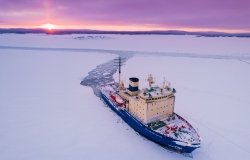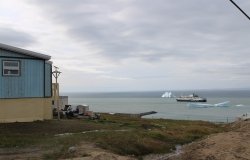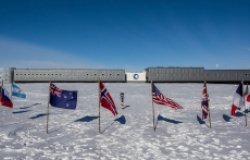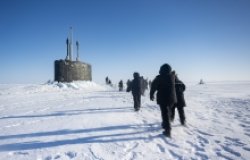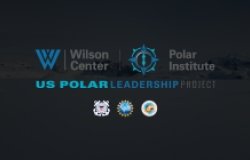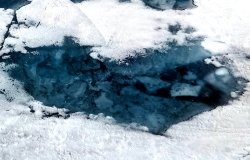Arctic 2014: Who Gets a Voice and Why It Matters
Tensions over security, access, and environmental impacts in the Arctic are rising. While members of the Arctic Council (Canada, Denmark, Finland, Iceland, Norway, Russia, Sweden, the United States) assert their established rights under new circumstances, an increasing number of non-Arctic states (including China, Korea, Japan, and Singapore) seek an active role in the region.
Overview
Tensions over security, access, and environmental impacts in the Arctic are rising. While members of the Arctic Council (Canada, Denmark, Finland, Iceland, Norway, Russia, Sweden, the United States) assert their established rights under new circumstances, an increasing number of non-Arctic states (including China, Korea, Japan, and Singapore) seek an active role in the region. Who are the key players and what are their primary objectives? What institutional framework will guarantee fair use and security in the Arctic? The discussion will focus on emerging challenges facing Arctic governance, analyze the goals and policies of key stakeholder nations, and evaluate means of promoting international cooperation in dealing with a rapidly changing environment.
The event is co-hosted under the Wilson Center’s new Polar Initiative by the Center’s Kissinger Institute on China and the United States, Asia Program, Canada Institute, China Environment Forum, Kennan Institute, and Global Europe Program and features analyses analyses by:
Heather A. Conley, Center for Strategic & International Studies, on U.S. Arctic Policies
Marlène Laruelle, George Washington University, on Russia’s Arctic Policies
Rob Huebert, University of Calgary, on Canada’s Arctic Policies:
Willy Østreng, Norwegian Academy of Polar Research, on the Arctic Policies of Nordic states
Aki Tonami, University of Copenhagen, on Arctic policies of Korea, Japan and Singapore
Anne-Marie Brady, Woodrow Wilson Center and the University of Canterbury, New Zealand, on China’s Arctic Policies
Documents & Downloads
- Arctic 2014: Who Gets a Voice and Why It MattersDownload
- Arctic 2014: Who Gets a Voice and Why It MattersDownload
- Arctic 2014: Who Gets a Voice and Why It MattersDownload
- Arctic 2014: Who Gets a Voice and Why It MattersDownload
- Arctic 2014: Who Gets a Voice and Why It MattersDownload
- Arctic 2014: Who Gets a Voice and Why It MattersDownload
Hosted By

Polar Institute
Since its inception in 2017, the Polar Institute has become a premier forum for discussion and policy analysis of Arctic and Antarctic issues, and is known in Washington, DC and elsewhere as the Arctic Public Square. The Institute holistically studies the central policy issues facing these regions—with an emphasis on Arctic governance, climate change, economic development, scientific research, security, and Indigenous communities—and communicates trusted analysis to policymakers and other stakeholders. Read more

Kissinger Institute on China and the United States
The Kissinger Institute works to ensure that China policy serves American long-term interests and is founded in understanding of historical and cultural factors in bilateral relations and in accurate assessment of the aspirations of China’s government and people. Read more

Indo-Pacific Program
The Indo-Pacific Program promotes policy debate and intellectual discussions on US interests in the Asia-Pacific as well as political, economic, security, and social issues relating to the world’s most populous and economically dynamic region. Read more

Canada Institute
The mission of the Wilson Center's Canada Institute is to raise the level of knowledge of Canada in the United States, particularly within the Washington, DC policy community. Research projects, initiatives, podcasts, and publications cover contemporary Canada, US-Canadian relations, North American political economy, and Canada's global role as it intersects with US national interests. Read more

China Environment Forum
Since 1997, the China Environment Forum's mission has been to forge US-China cooperation on energy, environment, and sustainable development challenges. We play a unique nonpartisan role in creating multi-stakeholder dialogues around these issues. Read more

Kennan Institute
The Kennan Institute is the premier US center for advanced research on Eurasia and the oldest and largest regional program at the Woodrow Wilson International Center for Scholars. The Kennan Institute is committed to improving American understanding of Russia, Ukraine, Central Asia, the South Caucasus, and the surrounding region though research and exchange. Read more

Global Europe Program
The Global Europe Program is focused on Europe’s capabilities, and how it engages on critical global issues. We investigate European approaches to critical global issues. We examine Europe’s relations with Russia and Eurasia, China and the Indo-Pacific, the Middle East and Africa. Our initiatives include “Ukraine in Europe” – an examination of what it will take to make Ukraine’s European future a reality. But we also examine the role of NATO, the European Union and the OSCE, Europe’s energy security, transatlantic trade disputes, and challenges to democracy. The Global Europe Program’s staff, scholars-in-residence, and Global Fellows participate in seminars, policy study groups, and international conferences to provide analytical recommendations to policy makers and the media. Read more
Thank you for your interest in this event. Please send any feedback or questions to our Events staff.
